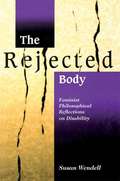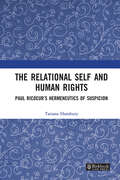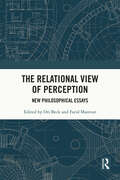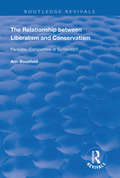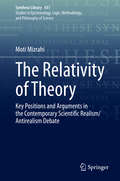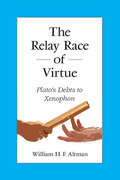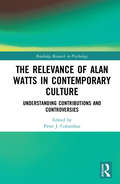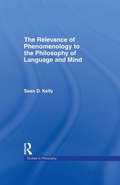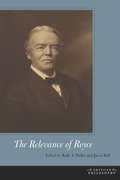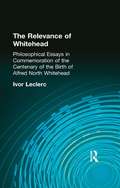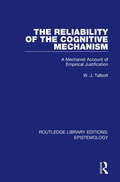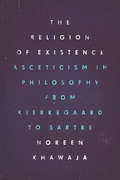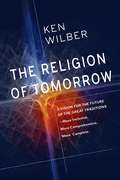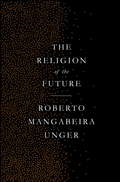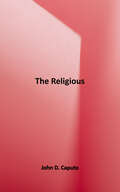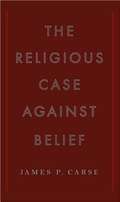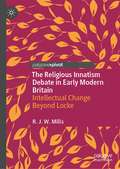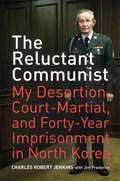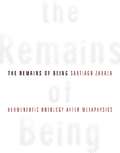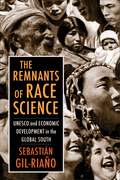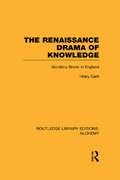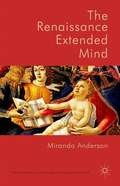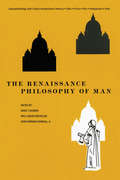- Table View
- List View
The Rejected Body: Feminist Philosophical Reflections on Disability
by Susan WendellThe Rejected Body argues that feminist theorizing has been skewed toward non-disabled experience, and that the knowledge of people with disabilities must be integrated into feminist ethics, discussions of bodily life, and criticism of the cognitive and social authority of medicine. Among the topics it addresses are who should be identified as disabled; whether disability is biomedical, social or both; what causes disability and what could 'cure' it; and whether scientific efforts to eliminate disabling physical conditions are morally justified. Wendell provides a remarkable look at how cultural attitudes towards the body contribute to the stigma of disability and to widespread unwillingness to accept and provide for the body's inevitable weakness.
The Relational Self and Human Rights: Paul Ricoeur’s Hermeneutics of Suspicion
by Tatiana HansburyThis book takes up Paul Ricoeur’s relational idea of the self in order to rethink the basis of human rights. Many schools of critical theory argue that the idea of human rights is based on a problematic conception of the human subject and the legal person. For liberals, the human is a possessive and self-interested individual, such that others are either tools or hurdles in their projects. This book offers a novel reading of subjectivity and rights based on Paul Ricœur’s re-interpretation of human subjectivity as a relational concept. Taking up Ricoeur’s idea of recognition as a ‘reciprocal gift’, it argues that gift exchange is the relation upon which authentic, non-abstract, human subjectivity is based. Seen in this context, human rights can be understood as tokens of mutual recognition, securing a genuinely human life for all. The conception of human rights as gift effectively counters their moral individualism and possessiveness, as the philosophical anthropology of an isolated ego is replaced by that of a related, dependent and embedded self. This original reinterpretation of human rights will appeal to scholars of legal theory, jurisprudence, politics and philosophy.
The Relational View of Perception: New Philosophical Essays
by Ori Beck Farid MasrourRelationalism is the view in philosophy of mind that particulars in our environment are constituents of conscious perception. It is an important theory of perceptual experience, offering explanations of perception's phenomenal character and its epistemic and semantic role. However, it has also been criticised for a lack of empirical grounding.In this outstanding collection, an international team of contributors examine relationalism and consider its role in philosophy of mind and perception across four key areas: The significance of empirical evidence to the theory of relationalism Dependence of experience on the subject’s internal makeup Hallucinations and the unity of perceptual experience Relationalism and empirical knowledge. The Relational View of Perception: New Philosophical Essays will be of great interest to advanced students and scholars in philosophy of mind.Contributors: Dominic Alford-Duguid, Rami Ali, Ori Beck, Alex Byrne, Elijah Chudnoff, Peter Epstein, Craig French, E. J. Green, Roberta Locatelli, Heather Logue, Farid Masrour, Alva Noë, Adam Pautz, Ian Phillips, Thomas Raleigh, Susanna Schellenberg, Umrao Sethi, Matthew Soteriou, and Lisa Titus.
The Relationship between Liberalism and Conservatism: Parasitic, Competitive or Symbiotic? (Routledge Revivals)
by Ann BousfieldFirst published in 1999, this volume is a radical text which contributes to the current debate over the future of liberal theory as it offers an explicit critique of some of the leading players in that debate - namely William Galston, Jeffrey Reiman and Richard Rorty. It also offers an implicit critique of the general de-ontological liberal position.
The Relativity of Theory: Key Positions and Arguments in the Contemporary Scientific Realism/Antirealism Debate (Synthese Library #431)
by Moti MizrahiThis book offers a close and rigorous examination of the arguments for and against scientific realism and introduces key positions in the scientific realism/antirealism debate, which is one of the central debates in contemporary philosophy of science. On the one hand, scientific realists argue that we have good reasons to believe that our best scientific theories are approximately true because, if they were not even approximately true, they would not be able to explain and predict natural phenomena with such impressive accuracy. On the other hand, antirealists argue that the success of science does not warrant belief in the approximate truth of our best scientific theories. This is because the history of science is a graveyard of theories that were once successful but were later discarded. The author eventually settles on a middle-ground position between scientific realism and antirealism called “relative realism”.
The Relay Race of Virtue: Plato's Debts to Xenophon (SUNY series in Ancient Greek Philosophy)
by William H. AltmanThe ancient view that Plato and Xenophon were rivals at least had the merit of allowing them to respond to each other; in modern times, the view that Plato wrote first eliminates the possibility of an exchange between the only two Socratics whose writings are preserved intact. Challenging the chronological assumptions on which Plato's across-the-board priority currently rests, the purpose of The Relay Race of Virtue is to show that Plato and Xenophon were responding to each other and that we can gain a greater appreciation for both by recognizing the back-and-forth nature of their friendly dialogue. Instead of regarding Xenophon as Plato's inept copyist, William H. F. Altman presents him as first blazing the trail for his fellow Socratic and then learning from Plato in return. By emphasizing "Plato's Debts to Xenophon," Altman is charitable to both, justifying Socrates' belief (Memorabilia 1.2.8) "that those of his companions who adopted his principles of conduct would throughout life be good friends to him and to each other."
The Relevance of Alan Watts in Contemporary Culture: Understanding Contributions and Controversies (Routledge Research in Psychology)
by Peter J. ColumbusWhilst accounting for the present-day popularity and relevance of Alan Watts’ contributions to psychology, religion, arts, and humanities, this interdisciplinary collection grapples with the ongoing criticisms which surround Watts’ life and work. Offering rich examination of as yet underexplored aspects of Watts’ influence in 1960s counterculture, this volume offers unique application of Watts’ thinking to contemporary issues and critically engages with controversies surrounding the commodification of Watts’ ideas, his alleged misreading of Biblical texts, and his apparent distortion of Asian religions and spirituality. Featuring a broad range of international contributors and bringing Watts’ ideas squarely into the contemporary context, the text provides a comprehensive, yet nuanced exploration of Watts’ thinking on psychotherapy, Buddhism, language, music, and sexuality. This text will benefit researchers, doctoral students, and academics in the fields of psychotherapy, phenomenology, and the philosophy of psychology more broadly. Those interested in Jungian psychotherapy, spirituality, and the self and social identity will also enjoy this volume.
The Relevance of Phenomenology to the Philosophy of Language and Mind (Studies In Philosophy Ser.)
by Sean D. KellyThis work discusses philosophical problems of perceptual content, the content of deomonstrative thoughts, and the unity of proposition. By demonstrating a connection between phenomenology and analysis, Kelly suggests ways in which they can be fruitfully pursued.
The Relevance of Royce (American Philosophy)
by Kelly A. Parker Jason BellThis collection represents the rediscovery of Josiah Royce’s rich legacy that has occurred over the past decade.The first part presents a series of historical explorations. The second takes up practical extensions of Royce’s work, bringing his ideas and methods to bear on contemporary philosophical matters. Among the topics addressed are the paradoxes of individualism; loyalty, democracy, and community; Royce’s efforts to respond to historical American racism; his contributions to engaged inter-faith religious discourse; the promise of his theory of error for a feminist account of knowledge; and his ethics of loyalty as a component in medical ethics.
The Relevance of Whitehead: Philosophical Essays in Commemoration of the Centenary of the Birth of Alfred North Whitehead
by Ivor LeclercThis is Volume X of seventeen in a collection on Metaphysics. Originally published in 1994, this text looks at the relevance of Alfred North Whitehead with a collection of philosophical essays on his ideas. He was a scientist-a mathematician and physicist. Then, on the eve of his retirement as professor of applied mathematics in the University of London, at the age of 63, he commenced his second career, as professor of philosophy in Harvard University.
The Reliability of the Cognitive Mechanism: A Mechanist Account of Empirical Justification (Routledge Library Editions: Epistemology)
by William J. TalbottOriginally published in 1990. Examining epistemic justification, truth and logic, this book works towards a holistic theory of knowledge. It discusses evidence, belief, reliability and many philosophical theories surrounding the nature of true knowledge. A thorough Preface updates the main work from when it was written in 1976 to include theories ascendant in the ‘80s.
The Religion of Existence: Asceticism in Philosophy from Kierkegaard to Sartre
by Noreen KhawajaTheReligion of Existence reopens an old debate on an important question: What was existentialism? At the heart of existentialism, Noreen Khawaja argues, is a story about secular thought experimenting with the traditions of European Christianity. This book explores how a distinctly Protestant asceticism formed the basis for the chief existentialist ideal, personal authenticity, which is reflected in approaches ranging from Kierkegaard's religious theory of the self to Heidegger's phenomenology of everyday life to Sartre's global mission of atheistic humanism. Through these three philosophers, she argues, we observe how ascetic norms have shaped one of the twentieth century's most powerful ways of thinking about identity and difference--the idea that the "true" self is not simply given but something that each of us is responsible for producing. Engaging with many central figures in modern European thought, this book will appeal to philosophers and historians of European philosophy, scholars of modern Christianity, and those working on problems at the intersection of religion and modernity.
The Religion of Tomorrow: A Vision for the Future of the Great Traditions - More Inclusive, More Comprehensive, More Complete
by Ken WilberA provocative examination of how the great religious traditions can remain relevant in modern times by incorporating scientific truths learned about human nature over the last century.A single purpose lies at the heart of all the great religious traditions: awakening to the astonishing reality of the true nature of ourselves and the universe. At the same time, through centuries of cultural accretion and focus on myth and ritual as ends in themselves, this core insight has become obscured. Here Ken Wilber provides a path for reenvisioning a religion of the future that acknowledges the evolution of humanity in every realm while remaining faithful to that original spiritual vision. For the traditions to attract modern men and women, Wilber asserts, they must incorporate the extraordinary number of scientific truths learned about human nature in just the past hundred years—for example, about the mind and brain, emotions, and the growth of consciousness—that the ancients were simply unaware of and thus were unable to include in their meditative systems. Taking Buddhism as an example, Wilber demonstrates how his comprehensive Integral Approach—which is already being applied to several world religions by some of their adherents—can avert a “cultural disaster of unparalleled proportions”: the utter neglect of the glorious upper reaches of human potential by the materialistic postmodern worldview. Moreover, he shows how we can apply this approach to our own spiritual practice. This, his most sweeping work since Sex, Ecology, Spirituality, is a thrilling call for wholeness, inclusiveness, and unity in the religions of tomorrow.
The Religion of the Future
by Roberto Mangabeira UngerA new philosophy of religion for a secular worldHow can we live in such a way that we die only once? How can we organize a society that gives us a better chance to be fully alive? How can we reinvent religion so that it liberates us instead of consoling us? These questions stand at the center of Roberto Mangabeira Unger's The Religion of the Future: an argument for both spiritual and political revolution. It proposes the content of a religion that can survive without faith in a transcendent God or in life after death. According to this religion--the religion of the future--human beings can be more human by becoming more godlike, not just later, in another life or another time, but right now, on Earth and in their own lives. They can become more godlike without denying the irreparable flaws in the human condition: our mortality, groundlessness, and insatiability.From the Trade Paperback edition.
The Religious
by John D. CaputoThis book offers landmark texts from Kierkegaard, Heidegger, Levinas, Derrida, and Irigaray, excerpts from the famous debate between Jean-Luc Marion and Dominique Janicaud, and ten original selections, some of which include coverage of feminist theology.
The Religious Case Against Belief
by James P. CarseAn insightful explanation for why belief-not religion-keeps us in a perilous state of willful ignorance Through careful , creative analysis, James P. Carse's The Religious Case Against Belief reveals a surprising truth: What is currently criticized as religion is, in fact, the territory of belief. Looking to both historical and contemporary crises, Carse distinguishes religion from belief systems and pinpoints how the closed-mindedness and hostility of belief has corrupted religion and spawned violence the world over. Drawing on the lessons of Galileo, Martin Luther, Abraham Lincoln, and Jesus Christ, Carse creates his own brand of parable and establishes a new vocabulary with which to study conflict in the modern world. Carse uses his wide-ranging understanding of religion to find a viable and vital path away from what he calls the Age of Faith II and toward open-ended global dialogue. .
The Religious Case Against Belief
by James P. CarseAn insightful explanation for why belief-not religion-keeps us in a perilous state of willful ignorance Through careful , creative analysis, James P. Carse's The Religious Case Against Belief reveals a surprising truth: What is currently criticized as religion is, in fact, the territory of belief. Looking to both historical and contemporary crises, Carse distinguishes religion from belief systems and pinpoints how the closed-mindedness and hostility of belief has corrupted religion and spawned violence the world over. Drawing on the lessons of Galileo, Martin Luther, Abraham Lincoln, and Jesus Christ, Carse creates his own brand of parable and establishes a new vocabulary with which to study conflict in the modern world. Carse uses his wide-ranging understanding of religion to find a viable and vital path away from what he calls the Age of Faith II and toward open-ended global dialogue.
The Religious Innatism Debate in Early Modern Britain: Intellectual Change Beyond Locke
by R.J.W. MillsThis book demonstrates that the common belief that humanity is naturally disposed to religion did not disappear with the emergence of the Enlightenment. Going beyond a narrow focus on John Locke’s empiricism, this vivid analysis reconstructs the vociferous, multivocal debate over the natural origins of religious belief in England and Scotland between c. 1650 and c. 1750. It enriches our understanding through examining hundreds of discussions of the relationship between human nature and religion, from a variety of genres and contexts. It shows that belief in religious innatism was a ubiquitous and enduring claim about human nature across the continuum of Christian thought in early modern Britain, and one deployed for a variety of reasons. While the doctrine of innate religious ideas did fall out of use, the belief that human nature was framed for religion continued in new forms into the eighteenth century.
The Reluctant Communist: My Desertion, Court-Martial, and Forty-Year Imprisonment in North Korea
by Charles Robert JenkinsThis book will take the reader behind the North Korean curtain and reveals the inner workings of its isolated society while offering a powerful testament to the human spirit.
The Remains of Being: Hermeneutic Ontology After Metaphysics
by Santiago ZabalaIn Basic Concepts, Heidegger claims that "Being is the most worn-out" and yet also that Being "remains constantly available." Santiago Zabala radicalizes the consequences of these little known but significant affirmations. Revisiting the work of Jacques Derrida, Reiner Schürmann, Jean-Luc Nancy, Hans-Georg Gadamer, Ernst Tugendhat, and Gianni Vattimo, he finds these remains of Being within which ontological thought can still operate. Being is an event, Zabala argues, a kind of generosity and gift that generates astonishment in those who experience it. This sense of wonder has fueled questions of meaning for centuries-from Plato to the present day. Postmetaphysical accounts of Being, as exemplified by the thinkers of Zabala's analysis, as well as by Nietzsche, Dewey, and others he encounters, don't abandon Being. Rather, they reject rigid, determined modes of essentialist thought in favor of more fluid, malleable, and adaptable conceptions, redefining the pursuit and meaning of philosophy itself.
The Remnants of Race Science: UNESCO and Economic Development in the Global South (Race, Inequality, and Health #7)
by Sebastián Gil-RiañoAfter World War II, UNESCO launched an ambitious international campaign against race prejudice. Casting racism as a problem of ignorance, it sought to reduce prejudice by spreading the latest scientific knowledge about human diversity to instill “mutual understanding” between groups of people. This campaign has often been understood as a response led by British and U.S. scientists to the extreme ideas that informed Nazi Germany. Yet many of its key figures were social scientists either raised in or closely involved with South America and the South Pacific.The Remnants of Race Science traces the influence of ideas from the Global South on UNESCO’s race campaign, illuminating its relationship to notions of modernization and economic development. Sebastián Gil-Riaño examines the campaign participants’ involvement in some of the most ambitious development projects of the postwar period. In challenging race prejudice, these experts drew on ideas about race that emphasized plasticity and mutability, in contrast to the fixed categories of scientific racism. Gil-Riaño argues that these same ideas legitimated projects of economic development and social integration aimed at bringing ostensibly “backward” indigenous and non-European peoples into the modern world. He also shows how these experts’ promotion of studies of race relations inadvertently spurred a deeper reckoning with the structural and imperial sources of racism as well as the aftermath of the transatlantic slave trade.Shedding new light on the postwar refashioning of ideas about race, this book reveals how internationalist efforts to dismantle racism paved the way for postcolonial modernization projects.
The Renaissance Drama of Knowledge: Giordano Bruno in England (Routledge Library Editions: Alchemy)
by Hilary GattiGiordano Bruno’s visit to Elizabethan England in the 1580s left its imprint on many fields of contemporary culture, ranging from the newly-developing science, the philosophy of knowledge and language, to the extraordinary flowering of Elizabethan poetry and drama. This book explores Bruno's influence on English figures as different as the ninth Earl of Northumberland, Thomas Harriot, Christopher Marlowe and William Shakespeare. Originally published in 1989, it is of interest to students and teachers of history of ideas, cultural history, European drama and renaissance England. Bruno's work had particular power and emphasis in the modern world due to his response to the cultural crisis which had developed - his impulse towards a new ‘faculty of knowing’ had a disruptive effect on existing orthodoxies – religious, scientific, philosophical, and political.
The Renaissance Extended Mind
by Miranda AndersonThe Renaissance Extended Mind explores the parallels and contrasts between current philosophical notions of the mind as extended across brain, body and world, and analogous notions in literary, philosophical and scientific texts circulating between the fifteenth century and early-seventeenth century. This perspective illuminates Renaissance texts and aims to inspire a more general reevaluation in the humanities of what constitutes cognition. Anderson begins with an overview of research and debates surrounding notions of the mind and subjectivity as extended in current cognitive scientific and philosophical research. This invites a reconsideration of other theories concerned with the relationship between brain, body and world, including psychoanalytical and literary theories. The book then explores Renaissance notions of the mind and subjectivity, in terms of the use of one's body, words, objects and other people as extensions ofthe mind and subject. It concludes by focusing on Shakespeare's literary and dramatic works. The Renaissance Extended Mind reveals the interdisciplinary potential and wider relevance of the notion of the extended mind: it establishes its capacity to contribute to a rethinking of the history of ideas and that it holds repercussions for literary methodologies, as well as offering a means to richer readings of literary texts.
The Renaissance Philosophy of Man
by Ernst Cassirer Paul Oskar Kristeller John Herman Randall Jr.Despite our admiration for Renaissance achievement in the arts and sciences, in literature and classical learning, the rich and diversified philosophical thought of the period remains largely unknown. This volume illuminates three major currents of thought dominant in the earlier Italian Renaissance: classical humanism (Petrarch and Valla), Platonism (Ficino and Pico), and Aristotelianism (Pomponazzi). A short and elegant work of the Spaniard Vives is included to exhibit the diffusion of the ideas of humanism and Platonism outside Italy. Now made easily accessible, these texts recover for the English reader a significant facet of Renaissance learning.
The Renaissance Philosophy of Man: Petrarca, Valla, Ficino, Pico, Pomponazzi, Vives
by Ernst Cassirer Paul Oskar Kristeller John Herman RandallDespite our admiration for Renaissance achievement in the arts and sciences, in literature and classical learning, the rich and diversified philosophical thought of the period remains largely unknown. This volume illuminates three major currents of thought dominant in the earlier Italian Renaissance: classical humanism (Petrarch and Valla), Platonism (Ficino and Pico), and Aristotelianism (Pomponazzi). A short and elegant work of the Spaniard Vives is included to exhibit the diffusion of the ideas of humanism and Platonism outside Italy. Now made easily accessible, these texts recover for the English reader a significant facet of Renaissance learning.
